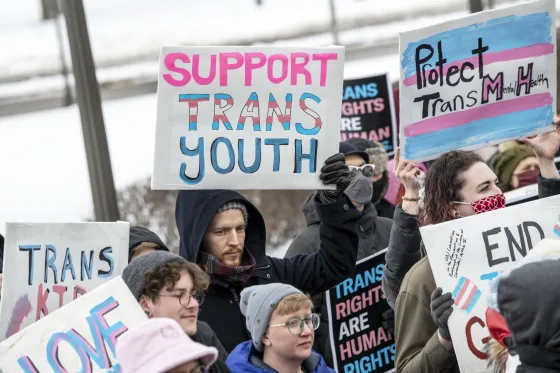November 13, 2024
Washington, D.C. — Following the election of President-elect Donald Trump, concerns have spiked among transgender and nonbinary youth, who are increasingly seeking support from crisis hotlines in response to his campaign’s stance on transgender issues. According to the New York Times, Trump’s campaign included a strong emphasis on “traditional” gender roles, pledging to limit protections for transgender youth in schools and potentially removing Title IX protections.
The Rainbow Youth Project, an organization dedicated to supporting LGBTQ+ youth, reported a significant increase in calls from transgender and nonbinary youth to its crisis hotline. Carolyn Fisher, the mother of a 16-year-old nonbinary teen in Alabama, described how her child was deeply affected by the anti-transgender messaging prominent in the recent election cycle. “Political ads felt like a personal attack,” Fisher shared, adding that her child faced bullying in school, with classmates taunting that “Trump is going to make him go back in the closet.”
During his campaign, Trump promised to address what he described as “woke culture” in schools by excluding transgender students from Title IX protections. Initially established to prevent gender discrimination in federally funded educational programs, Title IX has been expanded under the Biden administration to protect against discrimination based on gender identity. However, under Trump’s proposed policies, Title IX could revert to a “biological, binary understanding of sex,” as former Education Department counselor Bob Eitel noted.
One of the campaign ads supporting Trump, which aired over 15,000 times, captured his stance on the issue with the message: “Kamala is for they/them. President Trump is for you.” For many in the transgender community, this slogan intensified fears of a rollback in protections, with some feeling that the ad portrayed them as a societal threat.
Although Biden’s administration recently issued guidance expanding Title IX protections, it has faced opposition and legal challenges, resulting in halted implementation across 26 states. “Title IX will be a top priority,” said Candice Jackson, who headed the Education Department’s Office for Civil Rights in the first Trump administration, suggesting a swift shift in policy as Trump’s team takes office.
Trump’s approach has received widespread support from his conservative base. According to AP VoteCast, over half of voters, including a majority of Trump supporters, expressed concern that policies supporting transgender rights have gone “too far.”
As transgender youth brace for potential policy changes, organizations like the Rainbow Youth Project and It Gets Better have mobilized to provide additional support. The Rainbow Youth Project reported an increase to over 5,500 calls in the ten days following the election, significantly higher than the average monthly call volume of 3,700. In addition, groups like It Gets Better are enhancing their online presence, offering peer support groups and virtual town halls on platforms like Twitch and YouTube.
Despite these efforts, many young transgender Americans remain uncertain about their future in the U.S. Jude Armstrong, a transgender high school senior in Louisiana, has led protests against recent state laws that limit discussions of gender identity in schools. Now, with federal changes on the horizon, Armstrong is considering pursuing higher education abroad, though he feels a strong commitment to his local community. “How do you feel like you’re protecting your own community when you’re leaving that community and going to another country?” he asked.
For advocates, the potential federal changes pose new challenges. Elana Redfield, federal policy director for UCLA’s Williams Institute, highlighted the risks of losing federal support for inclusive school policies: “It sounds really dystopian to say that trying to be more inclusive could actually result in punishment from the federal government. But that is a risk.”
For those affected, the message from LGBTQ+ advocacy organizations remains one of resilience and support. Eli, an 18-year-old transgender student in New York, urged youth to remember they are not alone. “We will come out the other side,” Eli said, echoing the commitment to continue fighting for inclusivity despite the challenging times ahead.
Sources:
- The New York Times – Coverage of Trump’s campaign and transgender policy pledges
- Rainbow Youth Project – Statistics on crisis hotline call volume
- AP VoteCast – Survey data on voter attitudes toward transgender rights
- Williams Institute, UCLA School of Law – Commentary on federal policy impacts

